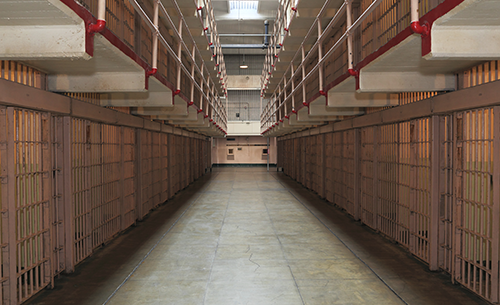I have been watching a short video clip of two young men climbing the U.S.-Mexico border fence, taken from the Mexican side of the border. They are almost certainly drug mules running narcotics north into the United States and from the way men casually approach their business, it's likely they've done this any number of times.
With that in mind, consider the sad business of criminal justice reform, which is being entertained by two concurrent bills in the House (H.R. 3713) and Senate (S. 2123). I have already written about the Senate bill, expressing hope that it would die aborning and that the House wouldn't take up this unnecessary gauntlet, but as with many things where immigration or law enforcement are concerned in recent years, my hope has proven to be forlorn.

The leadership and several members in both chambers would have us believe that the bills are solely for non-violent offenders, often those in simple possession of drugs who are hardened by incarceration. That, too, is the mental vision put forward by the administration, since this "reform" constitutes one of the president's outgoing legacy rhymes-with-bucket wishes. The president is quoted as saying, "We've got to make sure that Americans who have paid their debt to society receive a second chance".
I am perpetually at a loss to understand how or why our Republican-led Congress can so consistently be out of step with the American public, or so apparently in tune with the vagaries of this White House.
The truth is, the bills are so poorly and indiscriminately drafted that they don't meaningfully distinguish between an inner-city kid busted for a couple of joints and foreign cross-border professional mules, like those in the video, who when caught often plea down to simple possession in the circus-like atmosphere of crowded and overburdened border-area courts.
The federal Bureau of Prisons (BOP), responding to a letter from Sen. Jeff Sessions (one of the few responsible senators to publicly oppose the bills), stated that 70,368 noncitizens (of whom more than 73 percent were Mexican nationals) "passed through Bureau custody" for the first three quarters of the 2015 federal fiscal year. We don't know from the response whether they passed through BOP's custody into the waiting hands of ICE agents or just back to the street, which is worrying.
According to U.S. Sentencing Commission statistics, many of these noncitizen possession offenses occur along the southwest border (the Southern District of California, the District of Arizona, the District of New Mexico, the Western District of Texas and the Southern District of Texas). Almost all of the southwest border cases (92.6 percent in FY15, 94.8 percent in FY14, and 92.5 percent in FY13) were reported by the District of Arizona. Offenses in districts that are outside the southwest border account for only a small portion of noncitizen simple possession drug offenses:
| Fiscal Year | Offenses in Districts Outside the Southwest Border |
Percent of Total |
| 2013 | 270 | 11.6% |
| 2014 | 303 | 12.9% |
| 2015 | 342 | 15.0% |
As is evident, the percentage of cases outside the border area is minuscule compared with those that took place in immediate proximity to our international frontier with Mexico. Yet the political leaders pushing the "reform" bills are either unaware of, or choose to blithely ignore, this clear connection.
Nor have they publicly acknowledged that many of these "non-violent" offenders are in fact members of transnational gangs that wreak havoc on both sides of the border, as has been established by Texas law enforcement professionals analyzing gang activities in the state in 2015.
Finally, in October of last year, Immigration and Customs Enforcement (ICE) union president Chris Crane wrote to Senate leaders expressing his concern, noting that of the 6,000 federal Bureau of Prisons releases that took place under prior sentencing guideline reform measures, fully a third were aliens.
All of this data pretty much debunks the president's suggestion that the bills would focus on "Americans waiting to receiving a second chance", doesn't it? No one should underestimate the damage this mistaken "reform" effort will do to our already porous and dangerous southern border.
When the president solemnly intoned during his televised "executive actions on immigration" speech that he wanted to focus on deporting "felons, not families", one had no idea that what he really meant was to empty out the cells in our federal prisons and prematurely send alien convicts back home (if, indeed they are deported at all). In essence, the bills under consideration are a literal "get out of jail free" card; a form of amnesty from criminal (and perhaps even immigration deportation) charges, to which aliens who smuggle contraband across our borders should not be entitled.
A few observers have made comments to the effect that "as anyone who understands the federal system knows, nobody is locked up for 20 years in federal prison for simple drug possession. They are almost all illegal aliens who should be deported anyway, instead of sapping our funds by receiving food and shelter in our prisons."
I could not disagree more strongly. The border these days is, apparently by executive design, very, very poorly enforced. Statistics in recent years have shown that one-quarter of all apprehensions of aliens, both in the interior and at the border, are re-entrants after deportation. Why should alien felons be sent back to home and hearth, from whence they can begin using their fence-climbing skills and plying their lucrative cross-border trade again? The likelihood is that these drug mules will be hardened by their release — not by incarceration in our prisons — because that's what has to happen if they are to survive in the brutality of modern Mexico, a near-failed narco state that happens to share almost 2,000 miles of land border with us.
